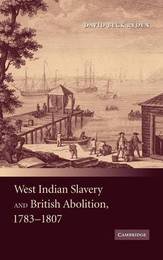
|
West Indian Slavery and British Abolition, 1783-1807
Hardback
Main Details
Description
This book challenges conventional wisdom regarding the political and economic motivations behind the final decision to abolish the British slave trade in 1807. Recent historians believe that this first blow against slavery was the result of social changes inside Britain and pay little attention to the important developments that took place inside the West Indian slave economy. David Beck Ryden's research illustrates that a faltering sugar economy after 1799 tipped the scales in favor of the abolitionist argument and helped secure the passage of abolition. Ryden examines the economic arguments against slavery and the slave trade that were employed in the writings of Britain's most important abolitionists. Using a wide range of economic and business data, this study deconstructs the assertions made by both abolitionists and antiabolitionists regarding slave management, the imperial economy, and abolition.
Author Biography
David Beck Ryden (Associate Professor of History, University of Houston - Downtown) has degrees in Economics and History from Connecticut College (BA), the University of Delaware's College of Business and Economics (MA), and the University of Minnesota's Department of History (Ph.D.). He is the author of several articles on British American slave societies for Slavery and Abolition, The Journal of Interdisciplinary History, and Social Science History. He is also editor of The Promoters of the Slave Trade, a collection of pro-slavery pamphlets produced by West Indian planters during the age of abolition. The Economic History Association selected Ryden's dissertation as a finalist for the Alexander Gerschenkron Prize. He was a postdoctoral fellow and lecturer in the Department of American Studies and History at Brunel University in London.
Reviews'David Ryden's impressively researched book on West Indian slavery and abolition breathes new life into a major historical controversy. Ryden's emphasis on political and economic contingency in the early nineteenth century adds fresh vigor to arguments connecting abolition to the decline of the plantation system. Even the immensely powerful West Indian proslavery interest, whose inner workings Ryden deciphers brilliantly, were helpless in the face of short-term economic trauma. Ryden's elegant study is a major achievement, transforming our understanding of how the slave trade came to be abolished in 1807.' Trevor Burnard, University of Warwick 'By examining Parliamentary Papers and Debates, the minutes of the meeting of The Society of West India Planters and Merchants, planter correspondence, and related primary sources for the years before the ending of the British slave trade, David Beck Ryden has provided an excellent contribution to the ongoing discussions centered on the writings of Eric Williams about the relative importance of economic as opposed to moral factors in the passage of the 1807 legislation ending the British slave trade. West Indian Slavery and British Abolition, 1783-1807 is a well-researched and clearly argued study that will repay reading by all interested in this ongoing debate.' Stanley Engerman, University of Rochester 'Well researched and cogently presented, Ryden's book argues that the economic state of the sugar-slave complex in the Caribbean directly affected the British decision to abolish their transatlantic slave trade. This counter-blast to current historiography on this topic will be widely discussed by British imperial historians.' Kenneth Morgan, Brunel University 'One of the many strengths of this book is its analysis of the planter lobby in Britain and its gradual loss of political influence. Another strength is the emphasis it puts on the growth of the West Indian economy at the end of the eighteenth century, and the ability of the planter class to experiment and innovate.' The Times Literary Supplement '... this book is a testament to Ryden's expertise in economic analysis and to his thorough archival research in the United Kingdom, the United States and Jamaica.' New West Indian Guide
|